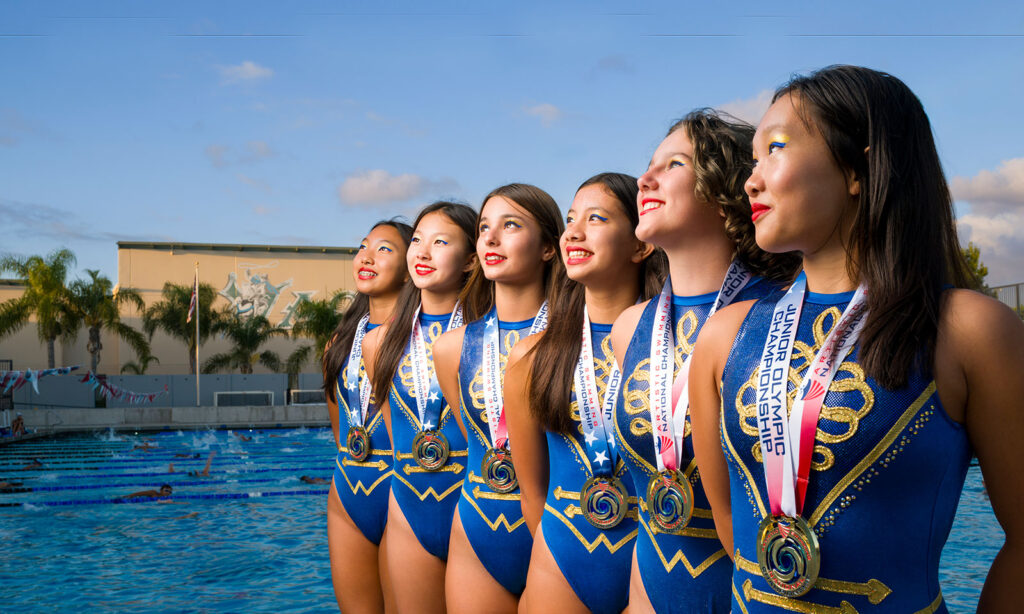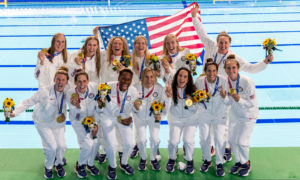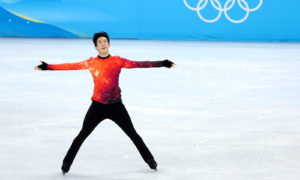The idea of finishing first didn’t seem real until they finished third.
After the preliminaries, the Meraquas of Irvine – an artistic swim team competing in the Junior Olympics – began to grasp the possibilities before them, the brightest of which gleamed in gold.
They were third entering finals this summer in Oregon. The Meraquas were in position to medal despite having points deducted in the prelims because of a misstep in their routine.
“We realized that if we hadn’t received that penalty, we would have been first,” Tori Jang says. “I think that gave us a lot more drive to swim better in the finals.”
They did swim better, so much so that they won, their victory in the 15-17 age group team free event coming after they mastered a routine that emphasized degree of difficulty.
“I was so excited for the girls,” coach Candy Hipp says. “They did an amazing job. They had the best swim ever. I was practically in tears.”
The Meraquas also won gold in the 15-17 duet free behind Karen Cho and Carmina Tan, two of the team’s most experienced competitors.
The right tweaks
Cho described the Junior Olympic experience as soaring, which is fitting since she’s a flyer, meaning she’s one of the swimmers launched into the air during routines designed to showcase artistry and athleticism in the sport formerly called synchronized swimming.
Cho, a sophomore at Beckman High School, was asked if she had any specific plans regarding her medals: “Win more.”
Though her swimmers were less sure, Hipp says she and her fellow coaches understood the gold-medal opportunity that was presented by the team’s performance in the prelims.
“When I saw their score, I was confident they were going to win. I don’t think they knew. So when they found out, it was really exciting to watch their reaction.”
coach Candy Hipp
Before the finals, the team reworked parts of its routine and tweaked some choreography, increasing the degree of difficulty.
“With the adjustments we made and the difficulty score of the routine, the coaches knew that they were going to do amazing,” Hipp says.
“After we received all our corrections from our coaches and we changed some of our acrobatics, it made our routine a lot stronger, and we went in really well prepared,” says Jang, an eighth grader at Pioneer Middle School.
Top-notch performance
Still, as the finals were unfolding, Hipp and her assistants were attempting to project the results and, at one point, thought the Meraquas were going to finish in second place.
But at the end of her swimmers’ routine, that expectation changed because of how well they had performed.
“When I saw their score, I was confident they were going to win,” Hipp says. “I don’t think they knew. So when they found out, it was really exciting to watch their reaction.”
In claiming gold, the Meraquas also overcame being down two swimmers from the typical lineup of eight. They entered the season with only seven and then lost another because of a health issue just before the Junior Olympics.
Along with Jang, Cho and Tan, the rest of the team included Eva Aktuccar, Reagan Schnore, Isabelle Yang and Anna Volodina.
Hipp praised the hard work of her swimmers and the contributions of her assistants.
“It was a whole group of us coaching,” she says. “It was definitely a team thing. This entire team is like a family. This was all about being a family and working together to achieve a goal.”









